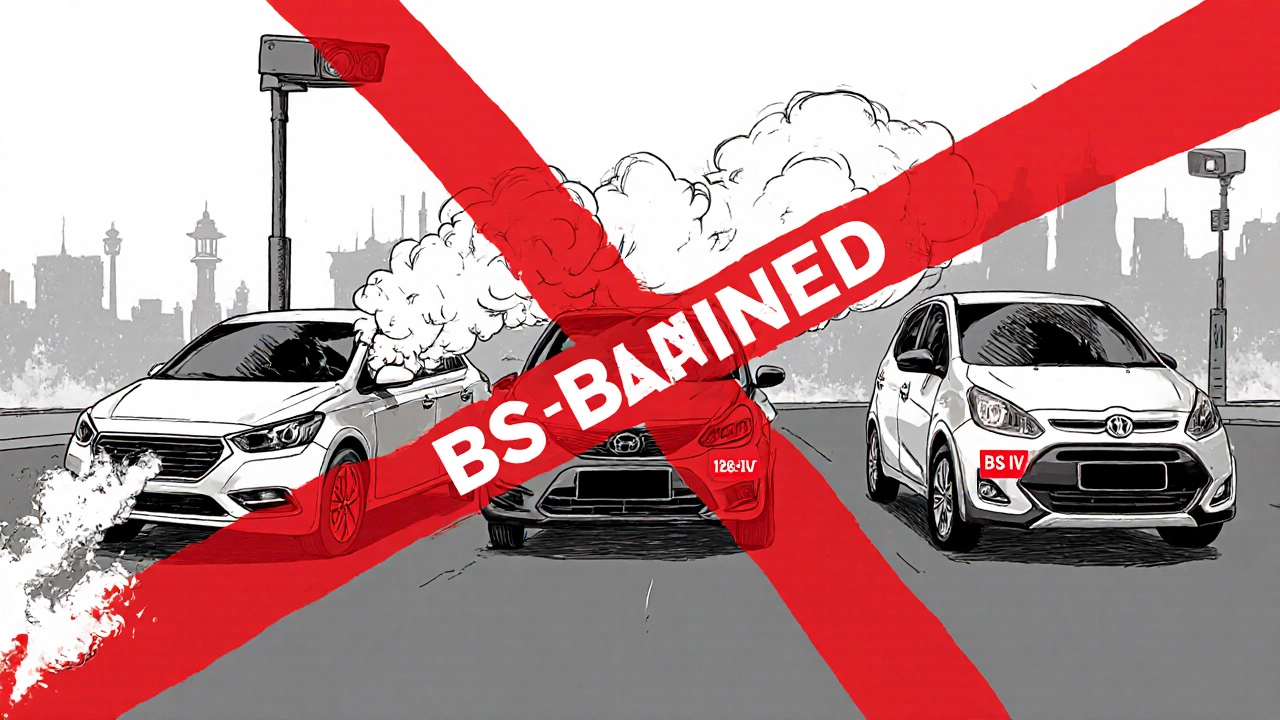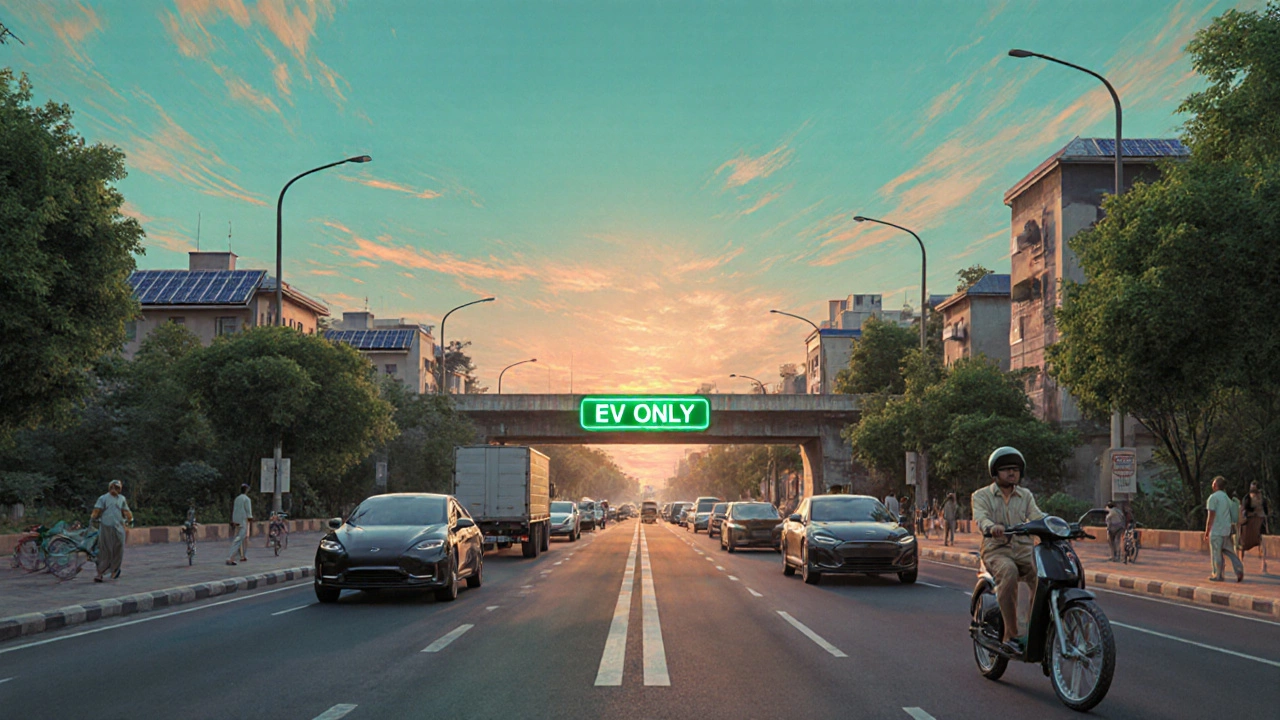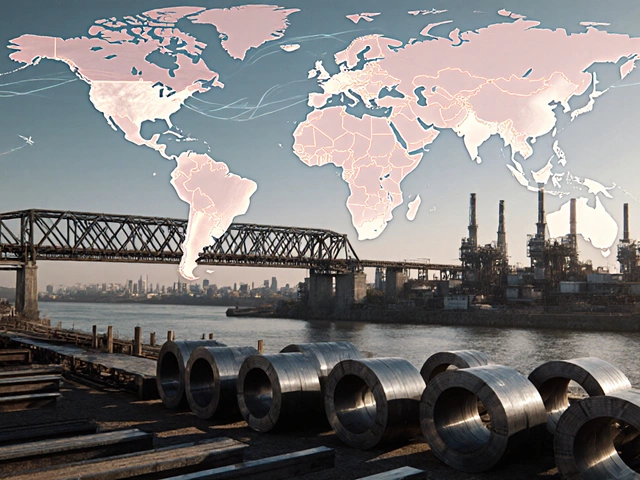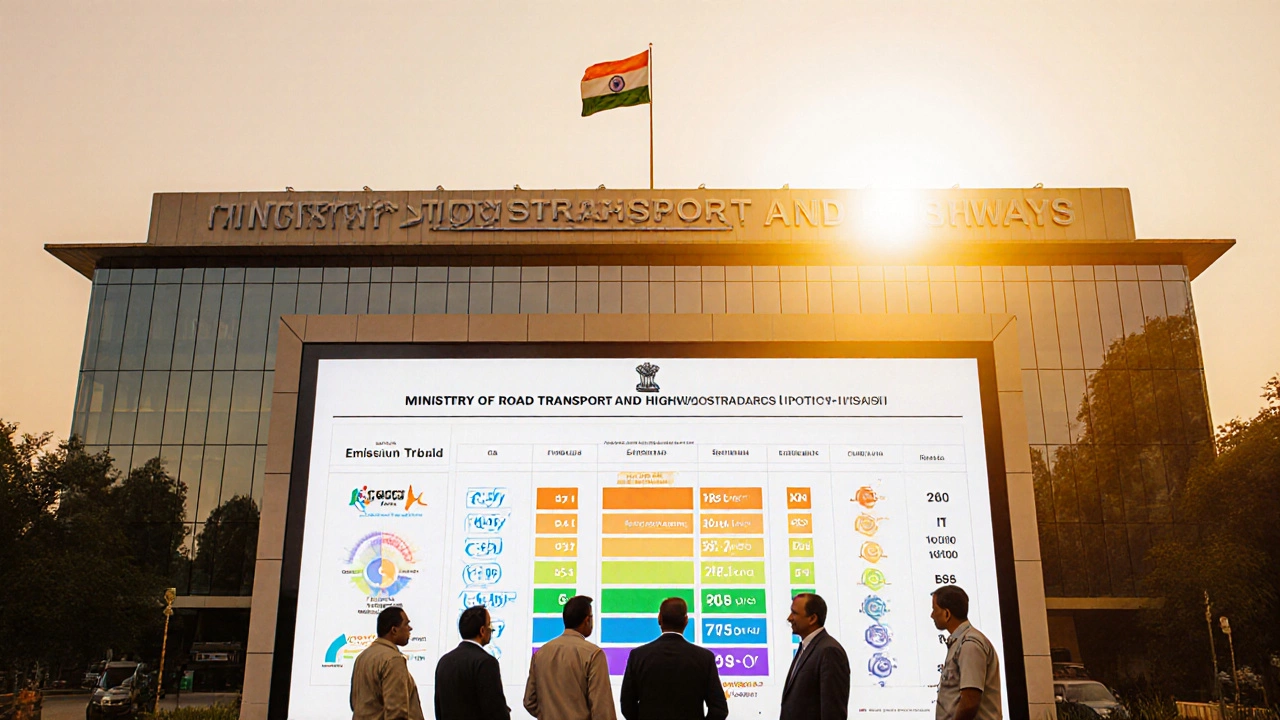Ever wondered why you can’t see certain models on Indian roads? The answer lies in a patchwork of vehicle bans India that target everything from old diesel cars to high‑displacement two‑wheelers. In this guide we break down the exact categories that are off‑limits, why the bans exist, and how you can tell if a vehicle you’re eyeing falls into a prohibited box.
Regulatory backbone: who decides what’s allowed
Ministry of Road Transport and Highways (MoRTH) is the central authority that drafts and enforces India’s road‑safety and emission policies. Alongside MoRTH, the National Green Tribunal (NGT) can order bans when pollution thresholds are breached. Together they shape the three most common grounds for a ban: emissions, safety, and fuel‑type compliance.
Emission standards that trigger bans
India moved from BS‑IV (Bharat StageIV) to BS‑VI in April2020. Any vehicle that still runs on BS‑IV or earlier-whether a 2012 diesel sedan or a 2015 petrol hatchback-cannot be newly registered. Existing owners can keep them on the road, but they cannot be sold or transferred without a special clearance, and many cities have outright traffic‑restriction orders for such cars.
- Petrol cars older than 2010: Not eligible for BS‑VI certification; effectively barred from new registrations.
- Diesel cars older than 2015: Required to meet BS‑VI, which many older engines cannot achieve without costly retrofits.
- Two‑wheelers over 150cc with BS‑IV: Banned in Delhi and several metro areas because of high particulate emissions.
Fuel‑type bans and incentives
The government is actively phasing out fossil‑fuel‑only vehicles in several high‑pollution zones. CNG vehicles are encouraged in Delhi and Hyderabad, where diesel cars above 1.5L are prohibited during peak hours. Conversely, Electric vehicles (EVs) enjoy tax breaks, but they are not “banned” - they’re simply preferred.
Specific vehicle categories that are banned
| Category | Ban Type | Reason |
|---|---|---|
| Petrol cars (pre‑2010) | New‑registration ban | Fail BS‑VI emission limits |
| Diesel cars (pre‑2015) | New‑registration ban | High NOx and PM output |
| Two‑wheelers >150cc (BS‑IV) | City‑wide traffic ban | Particulate matter |
| Heavy commercial vehicles >12t (non‑BS‑VI) | Import & registration ban | Excessive emissions, road wear |
| Luxury SUVs >3.0L diesel | Limited‑zone ban | Fuel inefficiency & pollution |
| Vehicles without safety airbags | Safety compliance ban | Risk of severe injury |

Import restrictions that affect foreign models
India imposes a steep import duty on fully built‑up (CBU) cars-often 100% or higher. But beyond cost, certain models are outright prohibited:
- Motorcycles with engine capacity above 250cc that do not meet BS‑VI.
- High‑performance sports cars lacking mandatory safety equipment (airbags, ABS).
- Any vehicle classified as “utility vehicle” that exceeds 2,500kg without a commercial license.
If a model fails the emission test at the “Automotive Research Association of India (ARAI)” laboratory, it cannot obtain a type‑approval certificate, effectively banning it from sale.
Regional bans you might encounter
Major metros have their own extra layers of restriction. For example:
- Delhi: Diesel cars older than 5years cannot enter the city during peak hours; all two‑wheelers above 125cc must run on CNG or be electric.
- Mumbai: A “no‑new‑diesel” policy for vehicles above 1.5L introduced in 2022.
- Kolkata: A temporary ban on vintage gasoline scooters during the winter smog season.
These rules are enforced through automated number‑plate cameras linked to the central transport database.
How to verify if a vehicle is banned
Before buying, follow these steps:
- Check the Vehicle Identification Number (VIN) on the Ministry’s online portal. The VIN reveals engine type, emission class, and year of manufacture.
- Confirm the vehicle’s type‑approval certificate issued by ARAI. If the certificate lists BS‑IV, the car cannot be newly registered after April2020.
- Search the “State Pollution Control Board” website for any city‑specific bans affecting that model.
- If importing, request an “Import Clearance Letter” from the Directorate General of Foreign Trade (DGFT); the letter will flag any outright prohibition.
Skipping any of these checks can land you with a vehicle that you cannot legally drive or sell.

Common pitfalls and how to avoid them
Many buyers assume a car that runs fine in another state will be fine nationwide. Here are the typical mistakes:
- Assuming all older cars are banned: Only those that fail BS‑VI are restricted for new registration. Older cars can still be owned; they just can’t change hands without clearance.
- Ignoring city‑specific rules: A vehicle legal in Delhi might be barred in Mumbai during peak hours. Always cross‑check the destination city.
- Overlooking safety equipment: Recent amendments require dual airbags in all passenger cars sold after 2022. Vehicles lacking airbags cannot be registered.
- Forgetting retrofitting costs: Converting a diesel to meet BS‑VI can cost 30‑40% of the car’s price, making replacement a smarter option.
Future outlook: what might be banned next?
India’s “Green Deal” aims to cut transport‑related emissions by 33% by 2030. Anticipated steps include:
- Full phase‑out of diesel passenger cars by 2027.
- Mandatory EV‑only zones in all Tier‑1 cities by 2025.
- Ban on any gasoline engine above 1.2L for new registrations.
Staying ahead means watching policy announcements from MoRTH and state transport departments.
Frequently Asked Questions
Can I register a pre‑2010 petrol car in a small town?
Yes, but only if the car passes a BS‑VI retro‑fit test. Most small towns lack the facilities, so owners usually keep the vehicle without transferring ownership.
Are imported electric scooters subject to any bans?
No blanket ban exists for EV scooters, but they must still meet safety standards (ABS, dual‑channel battery management) and obtain ARAI certification.
What happens if I drive a banned diesel truck into Delhi?
You’ll be fined up to₹15,000 per violation, and the vehicle may be impounded until a compliance certificate is produced.
Is it cheaper to retrofit a diesel car to BS‑VI or buy a used BS‑VI model?
Typically, retrofitting costs 30‑40% of the car’s market value, while a used BS‑VI car in good condition can be 10‑20% cheaper overall.
Do safety airbags affect a vehicle’s ban status?
Yes. Since 2022, any passenger car without dual front airbags cannot obtain a new registration certificate.



